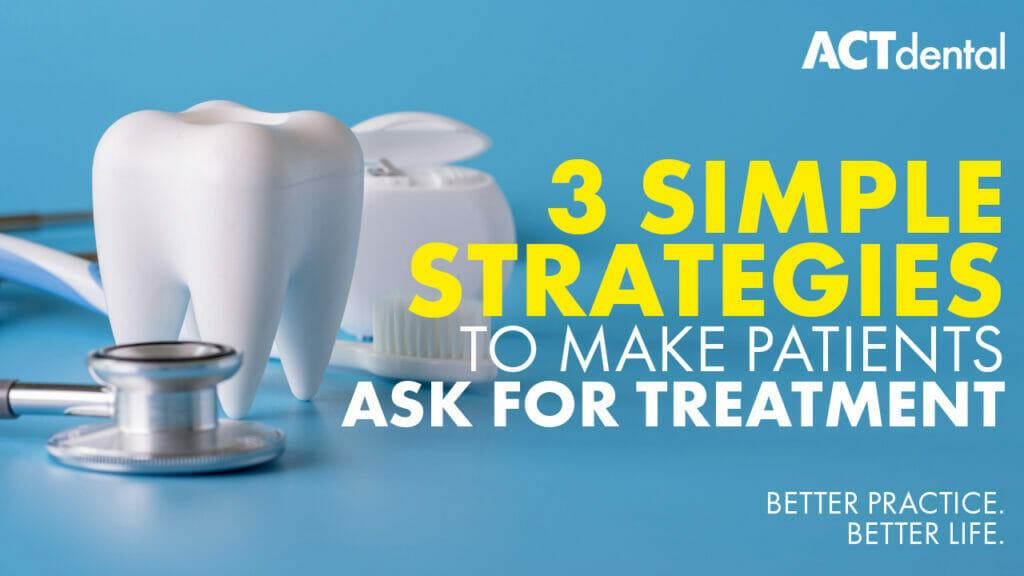3 Simple Strategies to Make Patients Ask for Treatment
These days, it seems like patients get more and more hesitant to accept the treatment you provide, and without that your productivity plummets. However, I don’t think the emphasis should be on case acceptance, but rather on the patient asking us for treatment. It’s exhausting trying to convince patients they have a disease process they don’t believe they have, so instead try shifting your focus to helping patients confront and understand their disease processes through co-discovery. I recently spoke with Katrina Sanders, the Dental WINEgenist herself, about the three strategies she uses to help create a desire for treatment in the patient.
- Stop Telling Them What They Have to Do
I think that back in the day, patients believed anything that a doctor in a white lab coat told them, but now WebMD and Dr. Google are causing people to start questioning. Adults don’t want to be told they have to do something—it needs to be more of their idea. So how do you get them to say, “It sounds like I have a problem”? You must learn to use your verbal skills to convey the:
- Problem
- Cause
- Solution
In order for patients to want treatment, they first need to recognize that there is a problem. If the patients don’t understand the problem, they’re not going to care about the consequences, and they’re certainly not going to care about the solution. The problem is that we often don’t learn how to engage patients and communicate effectively in dental school.
- Disrupt and Innovate
In hygiene school, you’re taught how to talk to the patient about periodontal disease, but you’re not taught how to talk to the patient about their barriers. That person sitting in the chair has motivations and emotions that are far different from the person you practiced with in school, and it can be a big obstacle. I think the underlying problem is that dentistry is very reluctant to change—people are so used to doing the same thing again and again, and I think perio in particular has a bad reputation for that. When you see patients in an asymptomatic disease process, it can be difficult to demonstrate the importance of treatment. It’s not like endodontics, where they’re in pain and understand that the treatment will make the pain go away.
You must learn to be early adopters and start disrupting the usual way of doing things because simply sticking with the bare minimum isn’t going to help your patients. If you want to do better, you need to stop doing the same thing and start asking yourself the uncomfortable questions:
- Why are we not perio charting our patients?
- Why are we skipping looking through their medical history?
- Why are we not asking patients about the medications they’re on?
- Why are we skipping taking vital signs?
- Why do we skip the oral cancer screening if the patient is running late instead of telling them we don’t have enough time to polish their teeth?
It’s like I tell clients all the time: “There are dentists that fix teeth, and there are dentists that change lives.” If you want to help your patients truly improve, you need to start with yourself.
- Use the A.S.K. Technique
The A.S.K. Technique is simple, and it’s where it all comes together: you’re going to use your Assessments to build a Strategy to increase the patients’ Knowledge. By disrupting the usual way of doing things and focusing on the patient’s well-being, you’re able to look at all the aspects of their history. You can then use that information to determine what the most effective approach is to help them understand the importance of treatment. It’s all about determining what they need to know in order to motivate them to want treatment.
Treatment acceptance is such a crucial component to running a successful practice, but instead of repeatedly trying to tell patients what they have to do, you should instead focus on building value for the treatment by increasing the patients’ knowledge. When that happens, you won’t have to tell them what they should do—they’ll ask you for the treatment. Any time you’re implementing new changes in your practice, I recommend talking to an expert. A Better Practice and a Better Life are within your grasp, so reach out to the coaches at ACT and they’ll give you the help you need to get your patients asking for treatment!
Kirk Behrendt is the Founder of ACT Dental
Kirk Behrendt
Kirk Behrendt is a renowned consultant and speaker in the dental industry, known for his expertise in helping dentists create better practices and better lives. With over 30 years of experience in the field, Kirk has dedicated his professional life to optimizing the best systems and practices in dentistry. Kirk has been a featured speaker at every major dental meeting in the United States. His company, ACT Dental, has consistently been ranked as one of the top dental consultants in Dentistry Today's annual rankings for the past 10 years. In addition, ACT Dental was named one of the fastest-growing companies in the United States by Inc Magazine, appearing on their Inc 5000 list. Kirk's motivational skills are widely recognized in the dental industry. Dr. Peter Dawson of The Dawson Academy has referred to Kirk as "THE best motivator I have ever heard." Kirk has also assembled a trusted team of advisor experts who work with dentists to customize individual solutions that meet their unique needs. When he's not motivating dentists and their teams, Kirk enjoys coaching his children's sports teams and spending time with his amazing wife, Sarah, and their four children, Kinzie, Lily, Zoe, and Bo.
RECENT POSTS
876: The Kois-Coachman Digital Dentistry Event & The IntraOral Scanner Festival – Dr. Christian Coachman
April 18, 2025
Rest Isn't A Reward, It's A Requirement!
April 14, 2025
Data Snapshot: # of Office Days Open
April 11, 2025
Weather Any Storm: The Power of Focus
April 07, 2025
871: Metric Mondays: Gross Profit Percentage: The Health Indicator of Your Practice – Dr. Barrett Straub
April 07, 2025
Embrace Conflict to Unlock Trust
April 04, 2025

